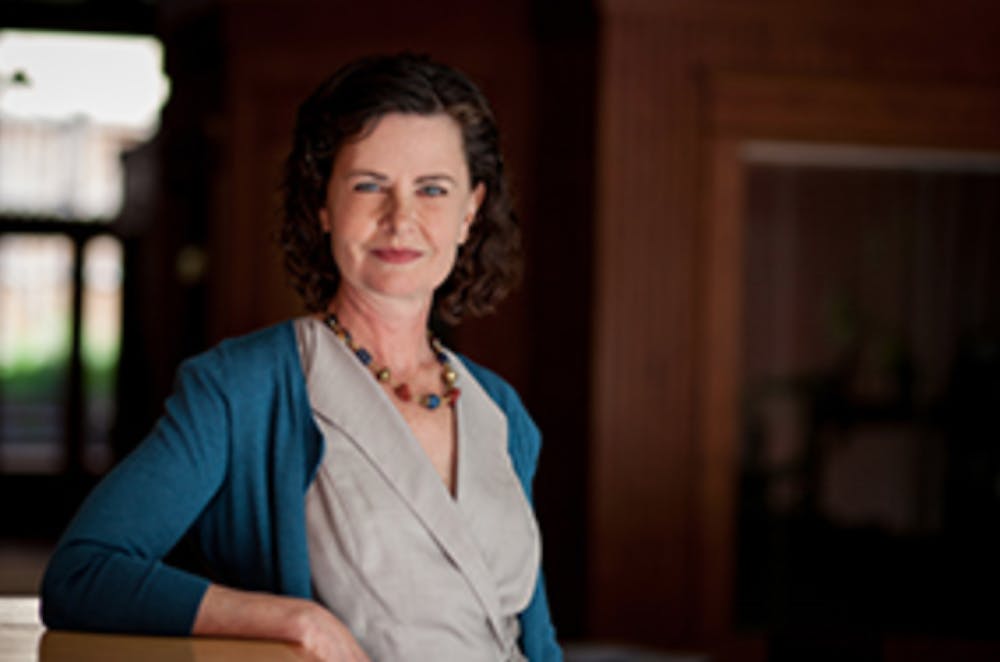Durham-based attorney Faith Herndon has always had a close relationship with Duke, having grown up on a family farm in Durham.
She also attended Yale University as an undergraduate with Priscilla Ward, director of gender, sexuality and feminist studies.
On Wednesday, Sept. 26, Herndon came to speak on campus about women in law, discussing gender issues in law school and the advantages of a law degree.
In her practice, she represents employees in cases of sexual harassment, negotiations and discrimination in the workplace. Her talk, "Women in the Law: The Real Life Experience of Practicing While Female," was part of the Gender Wednesday Luncheon series sponsored by the department of gender, sexuality and feminist Studies.
Herndon, citing former presidential candidate Hillary Clinton and Supreme Court Justice Ruth Bader Ginsburg as influential role models, emphasized the power of a law degree in the public sphere.
“Being a woman and lawyer in this country is a position of authority,” Herndon said. “I did it because I can make an individual difference in people’s life.”
Herndon criticized the Socratic method, the preferred teaching style of professors that focuses on asking questions and probing issues critically through debate.
She believes this teaching method creates an “aggressive, confrontational” student body, which plays right into “masculine stereotypes of leadership.” Moreover, she said faculty at esteemed law schools are disproportionally older white men, many of whom harbor preconceived notions.
Herndon continued by discussing how the barriers for women proliferate as they transition from law school to practicing. The hierarchical structure of both massive companies and local small businesses can mean that women struggle to progress from associate to partner.
Managers tend to display preference for fraternity brothers and members of law review boards, Herndon said, which often discriminate on the basis of sex, so they discount qualified women before conducting an interview. Although some companies ostensibly practice inclusive hiring, Herndon pointed out that females are often relegated to menial tasks such as coffee-pouring, form-filling and phone-answering.
Even the field of public policy reduces opportunity for women. In North Carolina, employers may deny applicants due to pregnancy.
When Herndon clerked for now-North Carolina Supreme Court Justice Robin Hudson, she fully comprehended the possibility of combining productive, meaningful work with a satisfying familial life. Hudson was a model of juggling a strenuous career with the necessary obligations of an infant son, and Herndon knew that she could do the same.
Thus, when she opened her own private firm, Herndon vowed to provide guidance to as many female lawyers as she could.
Herndon also discussed Judge Brett Kavanaugh, the Supreme Court nominee who has been accused of sexual assault by multiple women. Herndon used him to explain why we need more prominent female judges.
Although Herndon said she believes Kavanaugh’s accusers’ claims, she does not think that an isolated incident should wholly prohibit someone from appointment.
If Kavanaugh admits wrongdoing, reveals other transgressions in his involvement in President George W. Bush’s administration and commits to the conservation of women’s rights, Herndon would feel “much better” about his candidacy.
Even still, she would not exonerate Kavanaugh entirely.
“He’s going to be on the highest court in the land, so his record should be impeccable,” she added.
To conclude, Herndon implored students to remain active politically. She is optimistic about a brighter American future, one which resolves and learns from the #MeToo movement. Although current developments may strike alarm into some, Herndon encouraged tackling these problems the same way that she has handled her law career.
“You just keep going, even when the odds are stacked against you.," Herndon said.
Get The Chronicle straight to your inbox
Signup for our weekly newsletter. Cancel at any time.

